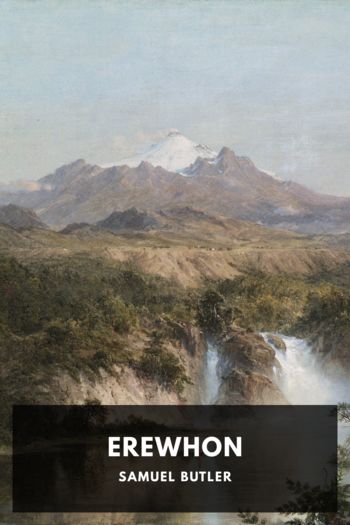Erewhon by Samuel Butler (ereader iphone .txt) 📕

- Author: Samuel Butler
Book online «Erewhon by Samuel Butler (ereader iphone .txt) 📕». Author Samuel Butler
“Will anyone bring an example of any living creature whose action we can understand, performing an ineffably difficult and intricate action, time after time, with invariable success, and yet not knowing how to do it, and never having done it before? Show me the example and I will say no more, but until it is shown me, I shall credit action where I cannot watch it, with being controlled by the same laws as when it is within our ken. It will become unconscious as soon as the skill that directs it has become perfected. Neither rose-seed, therefore, nor embryo should be expected to show signs of knowing that they know what they know—if they showed such signs the fact of their knowing what they want, and how to get it, might more reasonably be doubted.”
Some of the passages already given in Chapter XXIII were obviously inspired by the one just quoted. As I read it, in a reprint shown me by a Professor who had edited much of the early literature on the subject, I could not but remember the one in which our Lord tells His disciples to consider the lilies of the field, who neither toil nor spin, but whose raiment surpasses even that of Solomon in all his glory.
“They toil not, neither do they spin?” Is that so? “Toil not?” Perhaps not, now that the method of procedure is so well known as to admit of no further question—but it is not likely that lilies came to make themselves so beautifully without having ever taken any pains about the matter. “Neither do they spin?” Not with a spinning-wheel; but is there no textile fabric in a leaf?
What would the lilies of the field say if they heard one of us declaring that they neither toil nor spin? They would say, I take it, much what we should if we were to hear of their preaching humility on the text of Solomons, and saying, “Consider the Solomons in all their glory, they toil not neither do they spin.” We should say that the lilies were talking about things that they did not understand, and that though the Solomons do not toil nor spin, yet there had been no lack of either toiling or spinning before they came to be arrayed so gorgeously.
Let me now return to the Professor. I have said enough to show the general drift of the arguments on which he relied in order to show that vegetables are only animals under another name, but have not stated his case in anything like the fullness with which he laid it before the public. The conclusion he drew, or pretended to draw, was that if it was sinful to kill and eat animals, it was not less sinful to do the like by vegetables, or their seeds. None such, he said, should be eaten, save what had died a natural death, such as fruit that was lying on the ground and about to rot, or cabbage-leaves that had turned yellow in late autumn. These and other like garbage he declared to be the only food that might be eaten with a clear conscience. Even so the eater must plant the pips of any apples or pears that he may have eaten, or any plum-stones, cherrystones, and the like, or he would come near to incurring the guilt of infanticide. The grain of cereals, according to him, was out of the question, for every such grain had a living soul as much as man had, and had as good a right as man to possess that soul in peace.
Having thus driven his fellow countrymen into a corner at the point of a logical bayonet from which they felt that there was no escape, he proposed that the question what was to be done should be referred to an oracle in which the whole country had the greatest confidence, and to which recourse was always had in times of special perplexity. It was whispered that a near relation of the philosopher’s was lady’s-maid to the priestess who delivered the oracle, and the Puritan party declared that the strangely unequivocal answer of the oracle was obtained by backstairs influence; but whether this was so or no, the response as nearly as I can translate it was as follows:—
“He who sins aught
Sins more than he ought;
But he who sins nought
Has much to be taught.
Beat or be beaten,
Eat or be eaten,
Be killed or kill;
Choose which you will.”
It was clear that this response sanctioned at any rate the destruction of vegetable life when wanted as food by man; and so forcibly had the philosopher shown that what was sauce for vegetables was so also for animals, that, though the Puritan party made a furious outcry, the acts forbidding the use of meat were repealed by a considerable majority. Thus, after several hundred years of wandering in the wilderness of philosophy, the country reached the conclusions that common sense had long since arrived at. Even the Puritans after a vain attempt to subsist on a kind of jam made of apples and yellow cabbage leaves, succumbed to the inevitable, and resigned themselves to a diet of roast beef and mutton, with all the usual adjuncts of a modern dinner-table.
One would have thought that the dance they had been led by the old prophet, and that still madder dance which the Professor of botany had gravely, but as I believe insidiously, proposed to lead them, would have made the Erewhonians for a long time suspicious of prophets whether they professed to have communications with an unseen power or no; but so engrained in the human heart is the desire to believe that some people really do know what they say they know,





Comments (0)